Soaking in today’s Glorious Sunshine & David Livingstone, God’s Bold Missionary to Africa. (To see how quickly things can change, read all the way to the end)
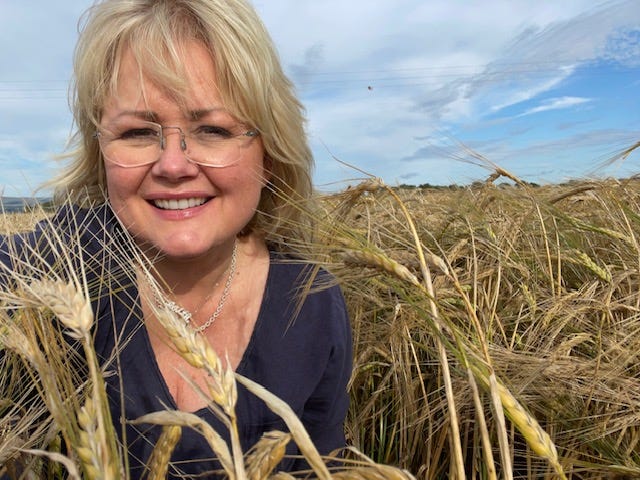
After surviving the soggiest summer on record, Scotland is finally basking in a much-deserved break from the relentless rain and dreary skies. Can you believe it? Summer has finally graced us with its presence—albeit fashionably late! While we are less than 100 days away from Christmas, we know to seize the day when the sun shines. With a crisp, warm, and dry September, the fields are buzzing with activity. Farmers are revving up their tractors and combines under the daytime sun as well as the glow of a full moon, ready to harvest this year’s bounty. So, grab your sunglasses (and maybe your wellies, just in case)—it’s time to celebrate the goodness of God in every golden grain!
Approximately 80% of Scotland’s land is dedicated to agriculture—a staggering amount that makes you wonder if the sheep have a union! 🐑 This vast expanse is a patchwork of arable farming, pastureland, and a variety of crops, including barley, wheat, and oats. No wonder everything looks so stunning this time of year! As the golden fields of grain sway in the warm breeze and farmers bustle about gathering their harvests, it’s hard not to think of those numerous Biblical passages that celebrate the fruits of the land. In the video below is our nephew Rod MacKenzie, the official family farmer, harvesting in the Highlands
Interestingly, barley, grass, and wheat feature prominently in Scripture as symbols of abundance and provision.
Barley is often mentioned in the context of harvest and provision. In the story of Ruth, for instance, Ruth gleaned in the barley fields (Ruth 2), highlighting themes of redemption and God’s provision. Barley was also used in offerings (Leviticus 23:10-14).
Psalms 23:2 speaks of green pastures, symbolizing peace and divine guidance. Jesus also refers to grass in Matthew 6:30, illustrating God’s provision.
Yet, wheat in particular holds significant spiritual symbolism throughout the Scriptures, representing both physical sustenance and deeper spiritual truths.
Wheat is often associated with abundance and blessings in the scriptures. For instance, Psalm 104:14 speaks of God providing grain for His people, highlighting His provision for our needs. But beyond that, wheat holds a deeper meaning—one tied to sacrifice, transformation, and the call to spread the Gospel.
In the New Testament, Jesus uses wheat as a metaphor for spiritual growth and the cost of discipleship. In John 12:24, He says, “Unless a grain of wheat falls to the ground and dies, it remains only a single seed. But if it dies, it produces many seeds.” This illustrates the necessity of surrender and transformation in the Christian life, emphasizing that through death and sacrifice comes new life and abundant fruitfulness.
Wheat is also central in Jesus’ parable of the wheat and the tares in Matthew 13, which illustrates the coexistence of good and evil until the end of the age. This parable reminds believers to remain vigilant and faithful, while also pointing to the ultimate harvest—the gathering of souls into God’s Kingdom. As Christians, we are called to participate in this harvest, sharing the Gospel and nurturing spiritual growth in ourselves and others.
In Matthew 9:37-38 (NIV), Jesus tells us, “The harvest is plentiful, but the workers are few. Ask the Lord of the harvest to send out workers into his harvest field.” As we admire the beauty of this harvest season, every golden stalk serves as a reminder of God’s abundant blessings and a call to pray for those laboring in the spiritual harvest, sharing God’s love and hope with the world. One such laborer was the bright and bold trailblazer, David Livingstone—God’s Fearless Pioneer Explorer and Missionary to Africa.
David Livingstone: A Laborer in the Harvest
David Livingstone, the renowned missionary and explorer, was born in Blantyre (near Glasgow) Scotland in 1813. Livingstone’s early life was marked by hardship. At age 10, he worked 14-hour days in a cotton factory and attended night school near Glasgow, Scotland. With his first wages, he bought a Latin book, studying while he worked to escape the factory’s monotony. His initial goal was to become a doctor and missionary in China, but due to the Opium War, he pivoted his focus to Africa.
Livingstone arrived in Africa in 1840, embarking on extensive travels that took him through uncharted territories. His explorations were not for personal glory; instead, he sought to understand the land and its people, advocating for their rights and well-being. Livingstone famously stated, “I am prepared to go anywhere, provided it be forward.” This forward-thinking mindset led him to establish mission stations where he preached the Gospel, educated locals, and provided medical care.
Driven by a deep faith and a commitment to share the Gospel, Livingstone dedicated his life not only to spreading Christianity but also to advocating for justice, particularly in the fight against the slave trade.
His impact was profound. Livingstone planted the seeds of Christianity in various regions, nurturing faith in communities that had never encountered it. His teachings emphasized love, compassion, and the importance of spiritual and physical healing. Many Africans came to know Christ through his work, and churches were established that continued to grow long after his death.
In addition to his spiritual impact, Livingstone’s writings and reports raised awareness in Europe about the harsh realities faced by Africans, particularly under the yoke of the slave trade. His passionate advocacy helped shift public opinion and inspired greater efforts to abolish slavery.
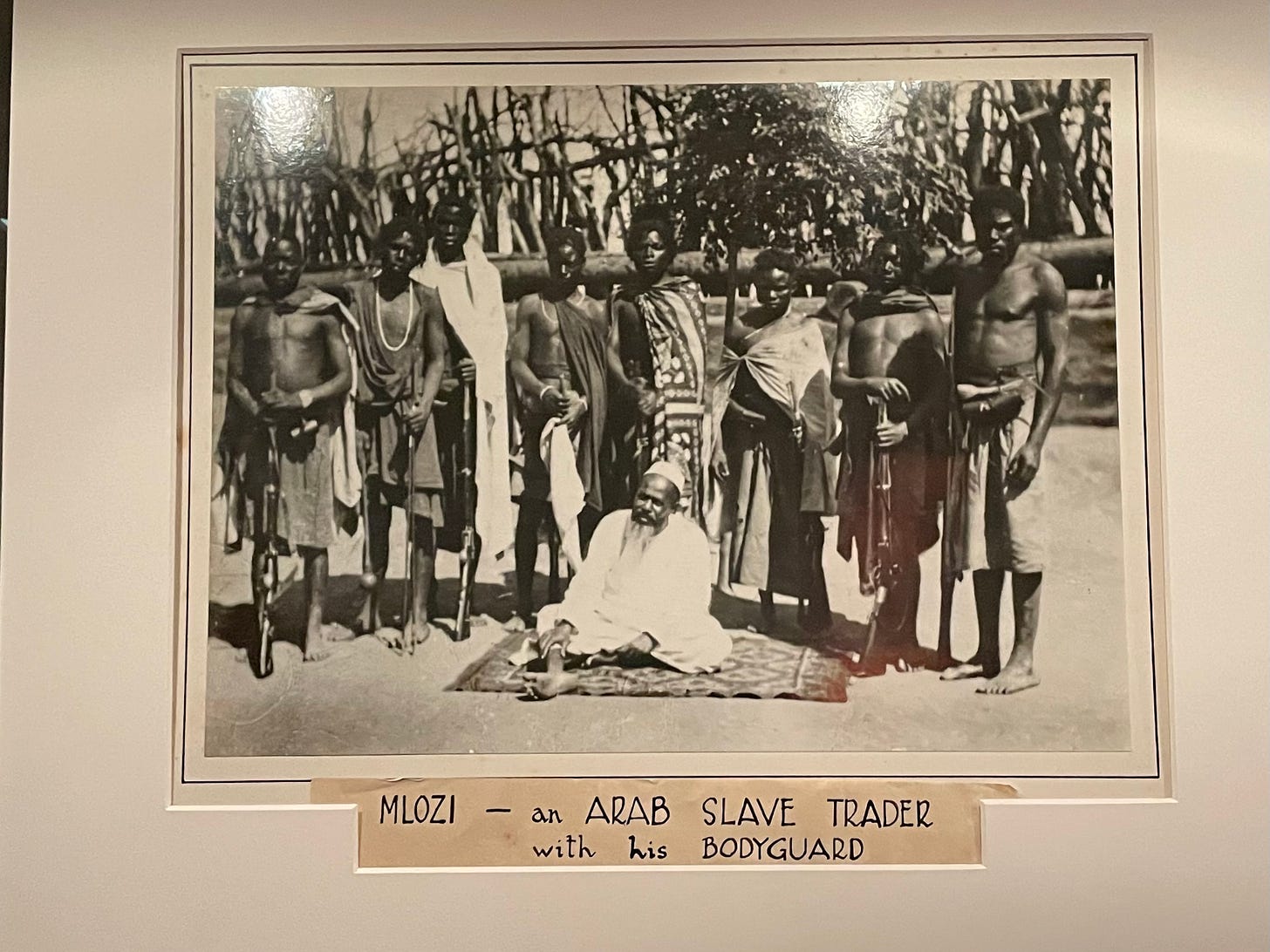
Arab Slave Trader (Livingstone Museum, Glasgow, Scotland)
Livingstone’s Missionary Calling
Livingstone believed that combating the slave trade in East Africa required a combination of “Christianity, Commerce, and Civilization.” However, his adventurous spirit sometimes led him to criticize fellow missionaries for their lack of commitment. His dedication to exploration and ministry also strained his family life; he and his wife, Mary, lived together for only four of their 17 years of marriage.
Despite the many challenges he faced, including health struggles, Livingstone’s explorations led to major discoveries, such as the renowned Victoria Falls. His awe at the natural beauty of the region was a testament to his love for Africa.

Victoria Falls, Zimbabwe. Photo by paul milley on Unsplash
One of the most famous encounters in history occurred on November 10, 1871, when Welsh-born journalist Henry Morton Stanley finally located the missing Scottish missionary and explorer Dr. David Livingstone in Ujiji, near Lake Tanganyika. Stanley greeted him with the now-famous words, “Dr. Livingstone, I presume?”
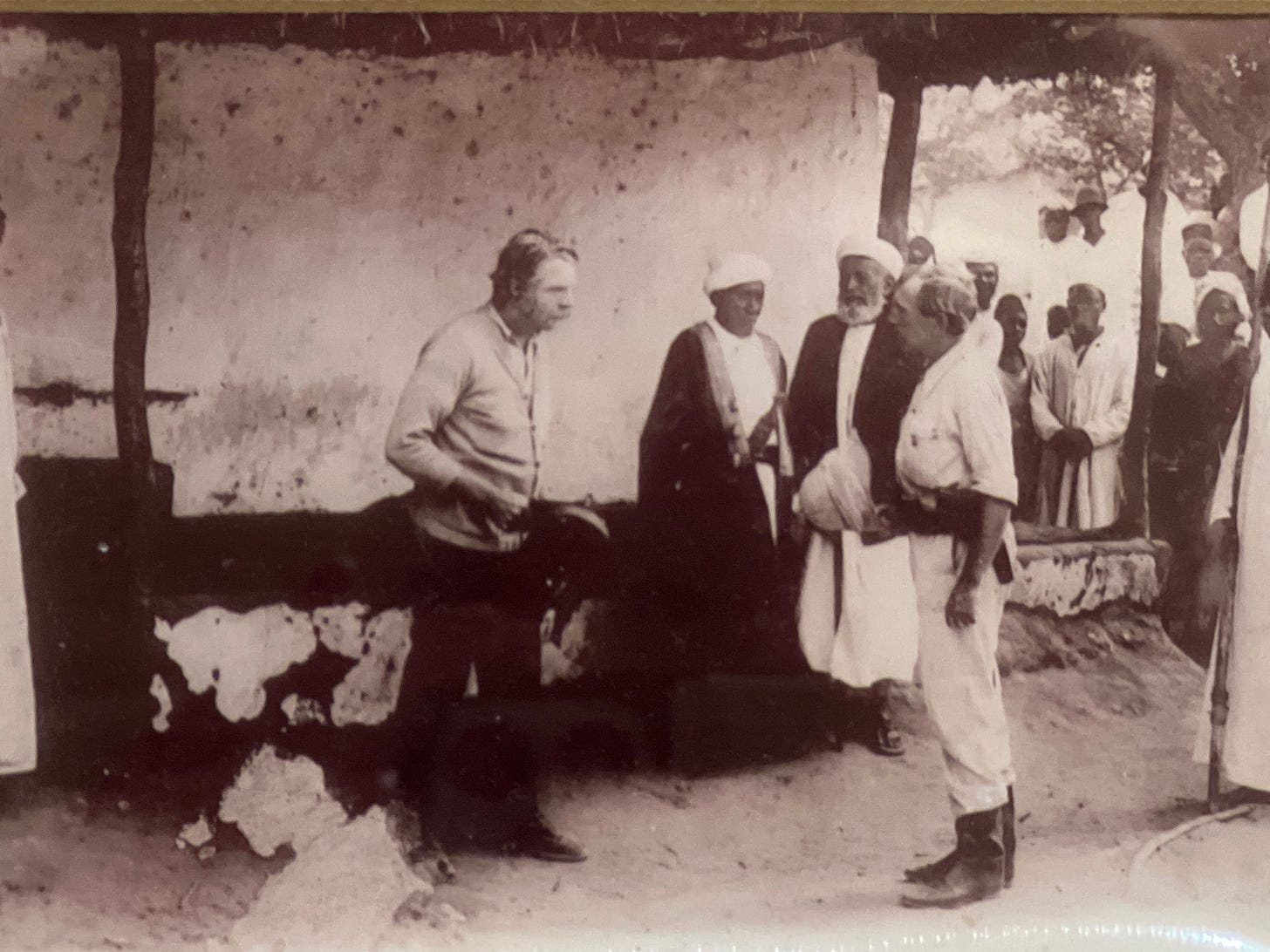
Stanley meeting Livingstone in Ujiji in 1871 and the infamous moment when he asked “Dr. Livingstone, I presume?”
During the late 1860s, Livingstone had been searching for the source of the Nile and compiling facts on the slave trade, conducted by Arab traders. His contact with the outside world had been lost for six years. In 1869, the New York Herald sent Stanley to find him. This encounter became iconic, symbolizing Livingstone’s persistence and dedication to his mission despite years oflation.
A Lasting Legacy: Sowing Seeds for the Future
Livingstone’s legacy inspired many, including other missionaries like Mary Slessor and Peter Cameron Scott, who continued his work in Africa. His dedication to the continent, and to Christ’s command to “go into all the world and preach the Gospel,” remains an enduring inspiration.
During a family summer gathering one year, I set up a table in our home with pictures, memorabilia and books dedicated to teaching our grandchildren about the legacies of Scottish Missionaries David Livingstone and Mary Slessor. I wanted them to know that Scotland’s history is richer than the secular Enlightenment, the writings of Robert Burns, and the infamous Loch Ness Monster. Scotland is a land which has been visited with the revival fires such as the Lewis Revival as well as and great preachers and missionaries
For that week we daily read about their lives, dressed up in safari hats, and visited the David Livingston Museum near Glasgow (followed by lunch at McDonald’s and a couple hours at a trampoline park!)
Both of these extraordinary Scots followed Christ’s command, giving their lives to missions and sharing the Gospel across the world. They were faithful in their day and they inspire us today.
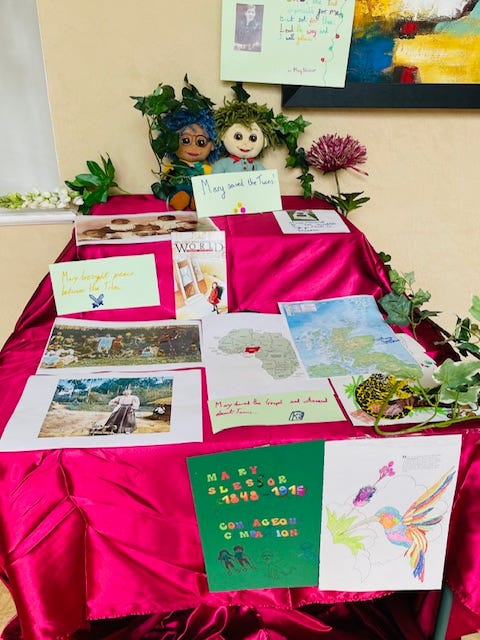
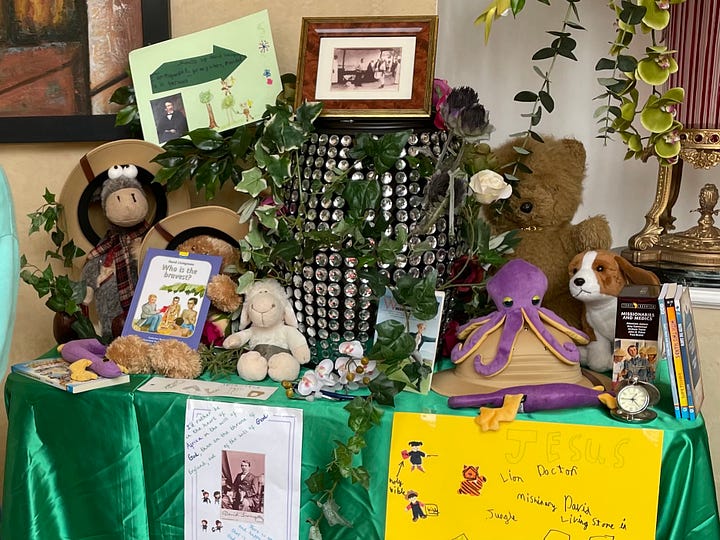
Learning tables of the life and ministry of David Livingstone and Mary Slessor
Livingstone spent his final years in Africa, continuing his fight against the slave trade and spreading the Gospel. In 1873, he died in the village of Chitambo, located in present-day Zambia. According to local customs, his heart ❤️ was buried in Africa, symbolizing his deep love and commitment to the people of the continent. However, his body was transported back to Britain, where it was interred in Westminster Abbey—a testament to the profound respect and honor he garnered.
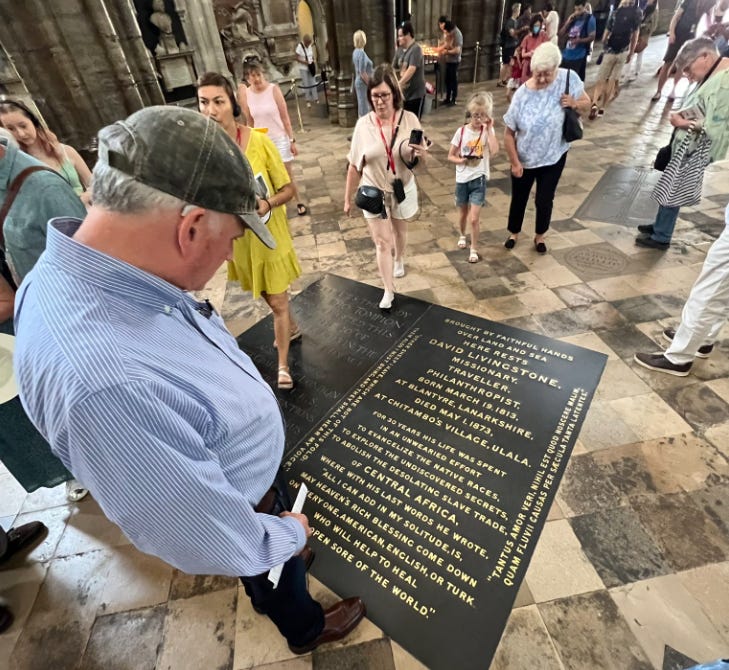
Franklin Graham visiting David Livingstone’s marker in Westminster Abbey. Credit: @Franklin_Graham via x.com
The Call to Be a Seed for God
As we reflect on the story of David Livingstone and the biblical symbolism of wheat and harvest, the question arises: Will you be a seed for God?
The great old hymn “We’ve a Story to Tell to the Nations” written by H. Ernest Nicol in 1896 reminds us:
"We've a story to tell to the nations that shall turn their hearts to the right. . . . We've a song to be sung to the nations that shall lift their hearts to the Lord, a song that shall conquer evil and shatter the spear and sword."
Just as Livingstone went wherever God called him, we are invited to trust in God’s guidance and bring in a mighty harvest for His glory and Kingdom where we are and where He sends us. David Livingston’s legacy as a Scottish missionary and explorer, along with his passionate anti-slavery advocacy, continues to inspire generations, illustrating the profound impact one individual can have on the world
The fields are ripe, and the laborers are few. Will you answer the call and be a seed for God’s Kingdom?
To learn more about David Livingstone, check out this book: Click here
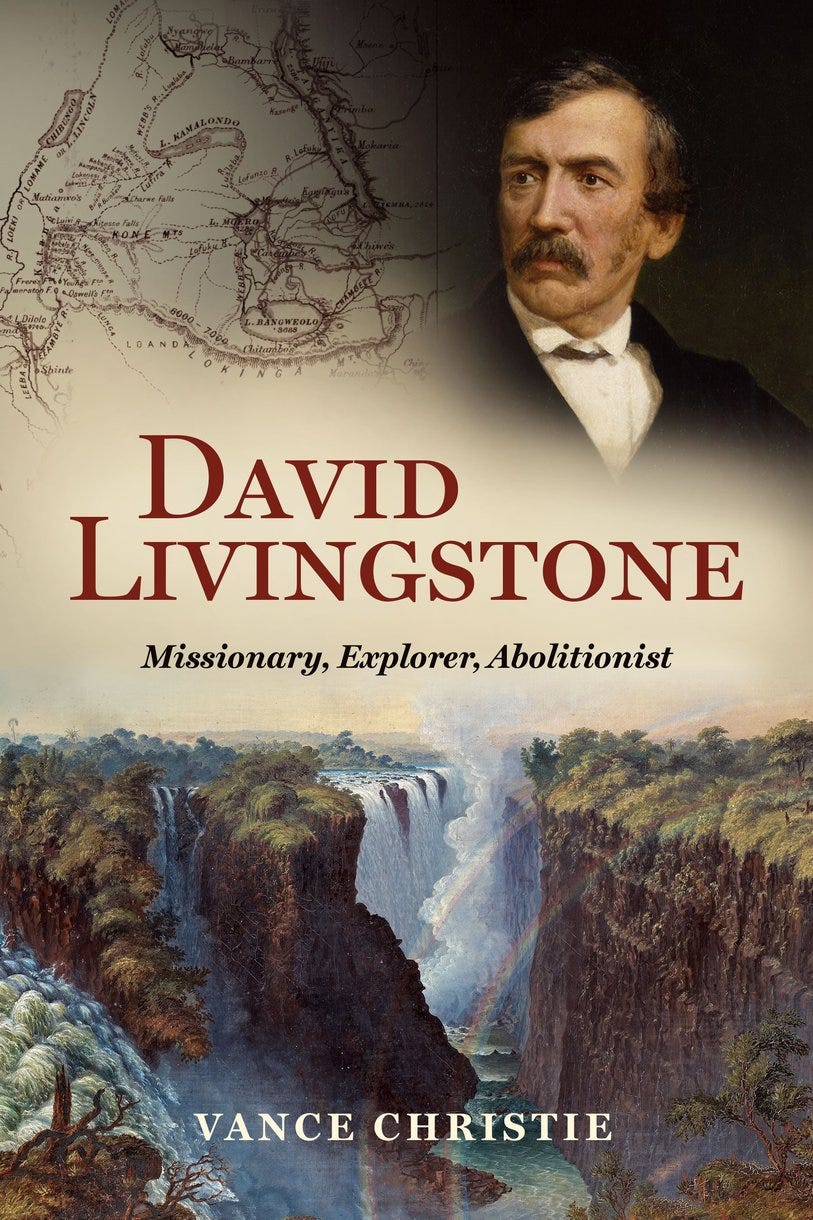
And for young readers to learn more, I recommend this one: Click here
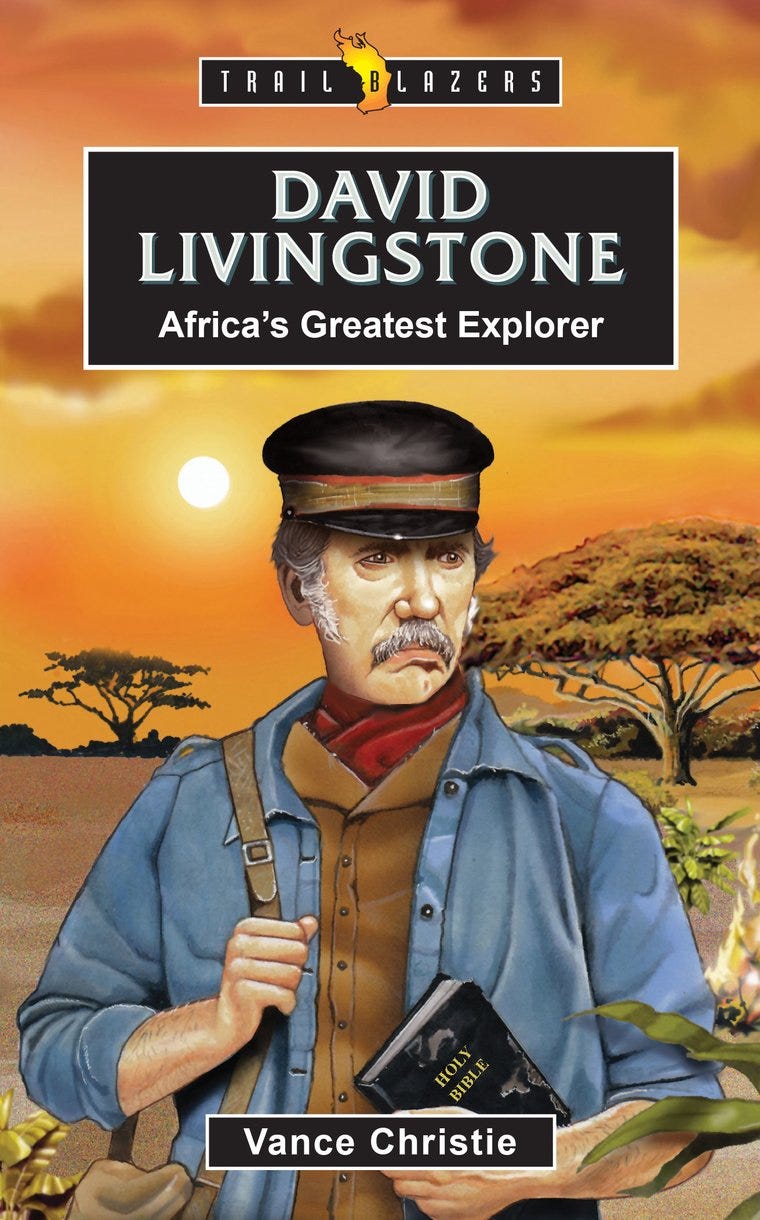
Have you experienced a moment where you felt called to step out in faith and trust God with an unknown future? How has God used those moments to plant seeds in your life or the lives of others? I’d love to hear your story—please share in the comments below!
P.S. Friends, the post I shared today was completed last night. However, the weather took a turn overnight, and our brief, warm “Scottish summer” has come to an end. This morning greeted us with grey skies and a chill in the air, prompting me to reach for my sweater and long sleeves. Here, we embrace each day as it comes, but I can’t help but miss the warmth of our four day summer already ⛅️ Wishing you all blessings!



